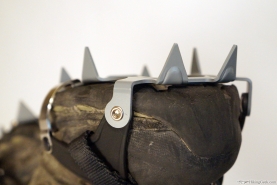powered by Advanced iFrame. Get the Pro version on CodeCanyon.
Why Buy?
I have found myself in situations where I wanted more traction than my MICROspikes could provide, but using mountaineering crampons (ie Black Diamond Contact Strap Crampons) was overkill. Kahtoola K•10 Hiking Crampons seemed to be a good solution.
First Impressions
An interesting feature of the K•10s is that they will work with many types of footwear. Step-in crampons require mountaineering boots with crampon welts on heel of the boot. Other crampons, such as CAMP USA Stalker Crampons or Black Diamond Contact Strap Crampons can be used with hiking boots, but only those with a limited amount of flex. The K•10s don’t have these restrictions. Like MICROspikes, they can work work with most types of footwear:
|
Leafspring® Flex Bar |
After unboxing, the K•10s felt lighter than expected (the CAMP Stalker and BD Strap Crampons above weigh 30-40% more). The were very easy to adjust and it required no tools to do so. The heel cup fit my boots well, which was nice since the heel on my usual boots is quite wide. Installing the Snow Release Skins (SRS) took a bit of elbow grease, but as you will see below, it was well worth the effort.































The Test
So far I’ve hiked approximately 4 miles wearing the K•10s on steep terrain (~30% slope). After my last experience with them, I’ve found that their design allows them to perform well where ‘slip-on’ traction devices are likely to fail:
- Devices using an elastomer or rubber harness do not provide much lateral stability. Walking across a steep slope, both of my heels have slipped out of my Trail Crampons. I’ve seen this happen to other hikers on multiple trips.
- The ‘slip-ons’ I’ve used do not have ‘anti-balling’ features. Without something to prevent snow buildup on the spikes, footing can quickly become an issue when hiking in wet, sticky snow.
The Good
- Very easy to put on and take off.
- The performance of K•10 Hiking Crampons compares favorably to Microspikes and Hillsound Trail Crampons. I was confident in my footing and felt comfortable on steep slopes that I’d be nervous on if I were wearing MICROspikes or Trail Crampons.
- Unlike mountaineering crampons, K•10s allowed me to walk with a normal gait/stance.
- They were comfortable and I hardly noticed they were on my feet.
- The Snow Release Skins (SRS) worked well (see pics below)
Due to problems with their gear, I’ve allowed two other hikers to use the K•10s. Together they put an additional 8 miles on them. Both individuals were impressed with the performance of the K•10s
The Bad
- A minor issue, but it can be difficult to adjust the size of the K•10s on the trail if the Snow Release Skins are installed. Ideally, you should do this before your hike.
Through the Wringer
The K•10s have ~12 total miles on them and that is not enough use to rate the durability of any traction device. At this point though, I have no reason to believe that the K•10s won’t hold up. I plan to keep track of how many miles I log with them and will post updates here. I plan to carry them on hikes where ‘balling’ could be a problem, where the angle of the slopes I’m hiking exceeds the limits of ‘slip-on’ devices, and where I won’t need front spikes.
Does anyone have experience with Kahtoola products? If so, please comment below.
| Disclaimer: Kahtoola provided the K•10 Hiking Crampons for this review |
For a side-by-side comparison of the winter traction devices manufactured by Kahtoola, please see this blog entry: Kahtoola’s Winter Traction Devices
Http iframes are not shown in https pages in many major browsers. Please read this post for details.
powered by Advanced iFrame. Get the Pro version on CodeCanyon.












silverfox
These are for sure my go to traction. Having done several rounds of New Hampshire Winter 48’s we run into every surface imaginable. The k-10’s are my choice of traction over g-12’s for light weight and easy walking. Boiler plate above treeline..say Edmunds Col or AirLine maybe The G-12s are a safer choice but I have never felt overmatched with K-10s keeping in mind that they lack in toe-pointing ascents of vertical ice..Great choice..great time.. I paid for mine
TheHikingGeek
Thanks for the info silverfox. Other have used them while I’ve used my G10s. They’ve been very impressed.
John lane
I use dry grease same as I use on my bike chain to stop the snow from sticking to my Hillsound Trail Crampons I reapply about every 3rd hike depending on distance travelled…
TheHikingGeek
Hi John,
Thanks for the tip! Do you have a brand of grease you recommend?